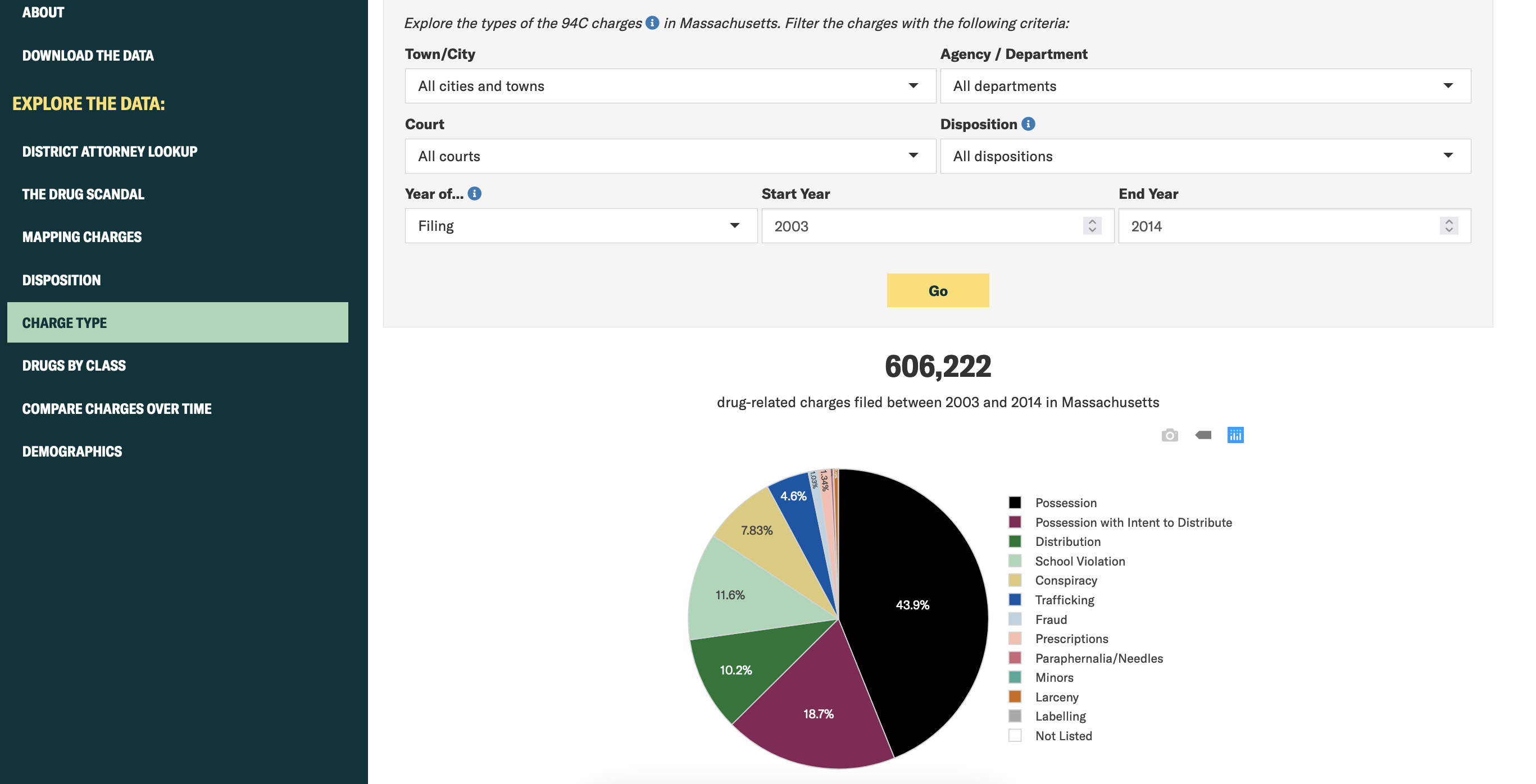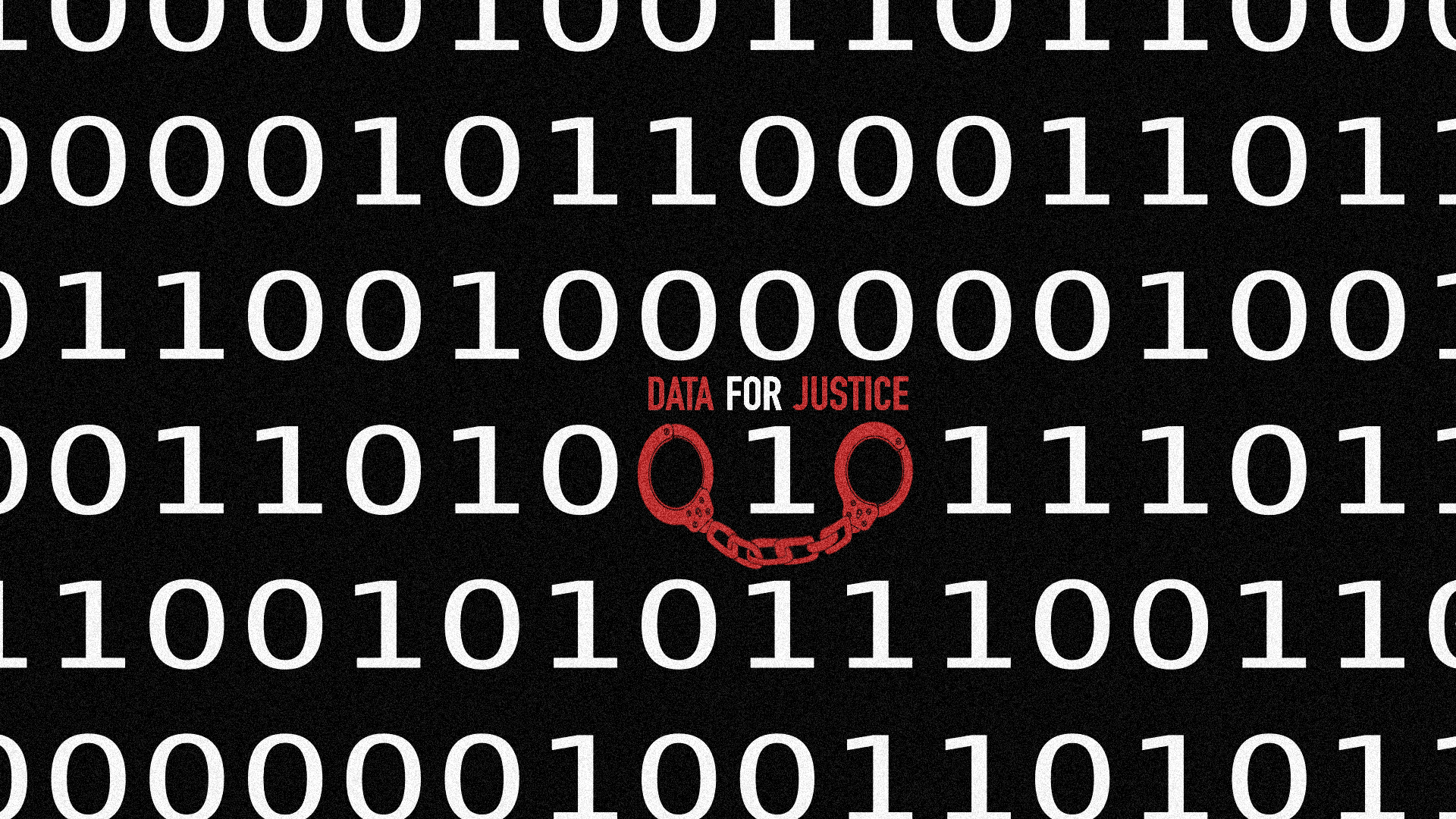Data shows drug policing in Massachusetts overwhelmingly targeted drug users
Drug prosecution data released today by the ACLU of Massachusetts shows that police and prosecutors throughout Massachusetts arrested and prosecuted people for simple drug possession at alarming rates between 2003 and 2014.
For the first time ever, the ACLU of Massachusetts is publishing comprehensive drug prosecution data covering this time period, giving residents, researchers, policymakers, and advocates a clear picture of how the drug war unfolded in courtrooms across the state over a decade. The data shows that even as politicians and police shifted away from “tough on crime” language towards acknowledging addiction as a disease, large numbers of people nonetheless continued to face arrest, prosecution, and conviction merely for possessing drugs.
Of the over 600,000 drug charges filed against people in Massachusetts between 2003 and 2014, nearly half (44 percent) exclusively concerned simple possession. An additional 19 percent of charges were for “possession with intent to distribute,” a charge often leveled at drug users. In total, 63 percent of all drug charges in Massachusetts during this period were for possession or possession with intent to distribute, representing approximately 382,000 of the just over 600,000 drug charges filed against people during this time period.
While these low-level drug charges clogged up courtrooms across the state and burdened people with jail time and fees, most of these cases did not lead to a guilty finding. Only 19 percent of simple possession cases resulted in a guilty finding or plea. Forty-two percent were dismissed outright.
Likewise, only one in four of the over 100,000 prosecutions for possession with intent to distribute lead to a guilty finding or plea.
On the other hand, drug trafficking charges represented a tiny fraction of the overall war on drugs in our state. Just 5 percent of all charges dealt with this more serious offense category.
The data reveals striking differences in how police enforce drug laws across Massachusetts, showing that a handful of communities aggressively—and even exclusively—police drug possession. In eight rural communities in the western part of the state, every single drug arrest resulting in prosecution pertained to drug possession. On the other hand, in larger cities, drug possession prosecutions represented a smaller, though still troubling, percentage of the total. In Boston, for example, 35 percent of all drug prosecutions were for possession. In Worcester, the figure was 33 percent; in Springfield, it was 29 percent. One-in-three is nonetheless a disturbingly high rate, particularly given that big city police departments have significantly more resources and staff to investigate serious offenses.
In addition to providing new details about the policing and prosecution of drug possession across the state, the ACLU’s data explorer allows users to see how drug policing has changed over time, in individual communities and statewide. Another feature, “Drugs by Class,” breaks down drug prosecution data by drug type, showing how prosecutions of specific classes of drugs have changed over time. Users interested in how drug prosecution patterns vary in each county can explore details about how different District Attorneys pursued the drug war on the “District Attorney Lookup” page. The tool also provides key data about the impact of the drug lab scandal and related conviction dismissals, showing that contrary to claims from some prosecutors, the mass dismissal of tens of thousands of fraudulent drug convictions did not lead to increases in reported violent crimes.
The ACLU obtained the data from the Massachusetts Supreme Judicial Court during multi-year litigation arising from systemic government misconduct at two separate drug labs responsible for testing substances. The litigation ultimately led to the mass dismissal of tens of thousands of tainted drug convictions.
In Massachusetts, court data is not subject to the public records law, but the ACLU has asked the Massachusetts Trial Court to make drug prosecution data for the time period 2014 to the present available to us. We will update this tool if we receive it.
Special thanks to Lauren Chambers for building this interactive data explorer.
Welcome to the Data for Justice Project
Government transparency is a hallmark of a free, open, and democratic society. In a democracy, the people rule. But it’s hard to advocate for reforms or policy changes when we don’t know what our government is doing. We can’t manage what we don’t measure.
That’s why the ACLU of Massachusetts is proud to announce the Data for Justice Project. We hope the project will arm activists, advocates, journalists, policy makers, and elected officials with relevant, timely information about how government functions—so we can fix it when it doesn’t.
Why data matters
A few years ago, the Massachusetts state legislature embarked on an ambitious project to reform the criminal legal system. Legislators were moved by personal stories of injustice, and also by data that revealed the systemic nature of these injustices.
Although Massachusetts incarcerates fewer people per capita than most other states, we have a higher incarceration rate than most countries in the world, and among the worst racial disparities anywhere on earth. These depressing data points helped to move the legislature to take bold action to pass omnibus criminal justice reform that, among other things, eliminated mandatory minimum sentencing for certain drug offenses.
Also tucked in to the omnibus criminal justice reform law was an open data measure backed by the ACLU, mandating that the state Executive Office of Public Safety and Security collect arrest data from every police department statewide, and publish it on a regular basis on the state’s website.
That reform is critical, because despite progress, we still don’t know nearly enough about what our government is doing, especially regarding criminal legal system information about arrests, prosecutions, incarceration, and probation and parole.
Even when we can get our hands on data from the criminal legal system, the information is often messy and difficult to work with — sometimes even locked inside PDF files that need to be OCRed or transcribed by hand into a usable format.
Making real the promise of open government in the digital age
The Data for Justice Project is an initiative by the ACLU of Massachusetts that aims to make data actionable, empowering lawyers, advocates, community organizers, journalists, activists, and the general public by:
- liberating government data sets and making them available in digestible formats;
- publishing documents obtained through ACLU of Massachusetts public records and Freedom of Information Act requests;
- advocating for open government at the municipal, county, and state levels;
- developing tools and dashboards to make complex data sets accessible to ordinary people; and
- using data to tell stories to advance the ACLU of Massachusetts’ Freedom Agenda.
The Data for Justice Project is a community resource and public education platform. We encourage data scientists, activists, and others to submit analyses of data sourced from this website, and recommend data sets we should include here. Submission does not guarantee publication. But if your work is compelling, we will work with you to give it a home. For more information, or to get involved, please contact the ACLU of Massachusetts Data for Justice Project at data [at] aclum [dot] org.
Special thanks to Paola Villarreal, who as a Technology Fellow worked with the ACLU of Massachusetts to develop the concept of the Data for Justice Project.


